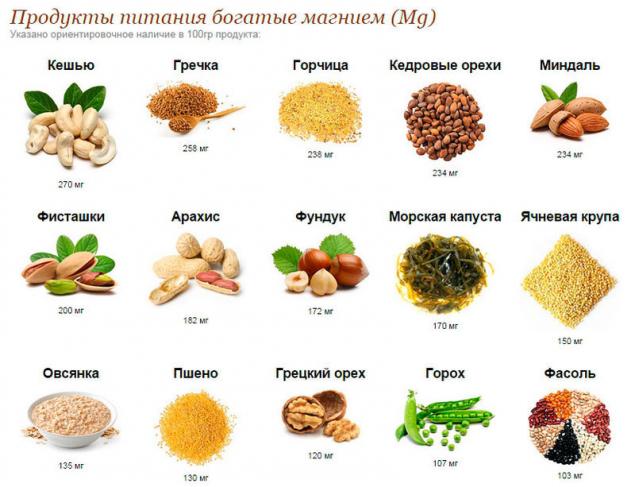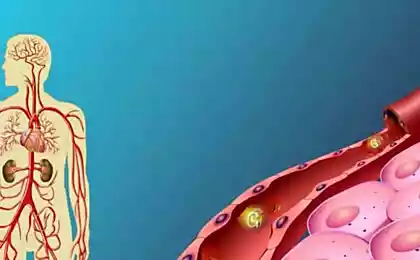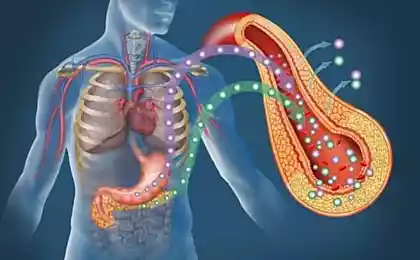769
Magnesium reduces the risk of diabetes and heart disease
Magnesium against diabetes
Magnesium is often considered a mineral for the heart and bones, but is misleading. At present, the researchers found 3751 magnesium binding protein human, indicating that its role in human health and disease may have been significantly underestimated.
In addition, magnesium is contained in more than 300 different enzymes in the body, including some that help regulate blood sugar levels. This is the mechanism by which magnesium is able to curb diabetes – this discovery is becoming increasingly supported by science.

Magnesium can reduce the risk of diabetes a number of major studies on the role of magnesium to maintain the efficient operation of metabolism, in particular, from the standpoint of insulin sensitivity, glucose regulation and protection against type 2 diabetes.
Increased intake of magnesium reduces the risk of abnormal glucose metabolism and insulin and slows the transition from the stage of prediabetes to diabetes in middle age. The researchers say: "the Intake of magnesium may be particularly useful for offsetting risk of developing diabetes in people at high risk".
Magnesium has a beneficial effect on insulin resistance in part, the beneficial properties of magnesium can be explained by its effect on insulin resistance. In one study, participants with overweight and insulin resistance received either 365 mg of magnesium daily or placebo. After six months, those who took magnesium reduced the level of fasting blood sugar and insulin resistance, compared with the control group.
Insulin resistance occurs when the body cannot use insulin properly, causing sugar level in the blood becomes too high. Insulin resistance is a precursor to type 2 diabetes and a risk factor for many other chronic diseases.
The mechanism by which magnesium controls glucose homeostasis and insulin, apparently, includes two genes responsible for magnesium homeostasis. Magnesium is also required for activation of the tyrosine kinase enzyme which acts as a switch in many cellular functions, and is necessary for normal functioning of insulin receptors.
It is known that people with insulin resistance increased excretion of magnesium in the urine, which further contributes to lower levels of magnesium. The loss of magnesium, apparently, occurs in the background of an increase in the level of glucose in the urine, which increases the amount of urine.
Thus, inadequate intake of magnesium triggers a vicious cycle of low magnesium levels, improving insulin and glucose, and excess excretion of magnesium. In other words, the less magnesium in the body, the less he is able to "hook" the item.
Magnesium is important not only for the prevention of diabetes...Magnesium is a mineral used by every organ in the body, especially the heart, muscles and kidneys. If you suffer from unexplained fatigue or weakness, heart rhythm disorders, muscle spasms or twitching eyes, the reason probably lies in the low level of magnesium. In addition, magnesium is necessary for:
Dr. Dean for more than 15 years studying magnesium and writes about it. The latest revised edition of her book "Miracle of magnesium" came out in 2014 — in it you can learn about 22 medical problems that causes or initiates a magnesium deficiency, all of which are scientifically proven. These include:
Anxiety and panic attacks
Asthma
Blood clots
Bowel disease
Cystitis
Depression
Detoxification
Diabetes
Fatigue
Cardiovascular disease
Hypertension
Hypoglycemia
Insomnia
Kidney disease
Liver disease
Migraine
Diseases of the musculoskeletal (fibromyalgia, cramps, chronic back pain, etc.)
Nervous diseases
Obstetrics and gynecology (PMS, infertility, preeclampsia)
Osteoporosis
Raynaud's Syndrome
Tooth decay
5 factors associated with the level of magnesium:
Juicing vegetables is a great way to get magnesium in sufficient quantities from your diet. However, most foods grown today deficiency of magnesium and other minerals, so a sufficient amount of magnesium is not only a question of using rich in magnesium products (although that is also important).
Furthermore, many grown in our time, the products are herbicides, such as glyphosate, which act as chelators, effectively blocking the uptake and utilization of minerals. The result is quite difficult to find products that are truly rich in magnesium. Cooking further depletes magnesium. If you choose supplements, keep in mind that the market sold a huge variety of them, because magnesium must be bound with another substance.Such thing as Supplement with 100 percent of the magnesium does not exist.
A substance that is used in any connection affect the absorption and bioavailability of magnesium and may have a few more and focused action on health. The table below shows some differences between the various forms. Magnesium Treant – one of the best sources, as it penetrates cell membranes, including the mitochondria, boosting energy levels. In addition, it overcomes the blood-brain barrier and works wonders for the treatment and prevention of dementia and improving memory.
In addition to taking supplements is another way to improve your magnesium status are regular baths or foot baths with Epsom salts. It is sobolsoft of magnesium, which is absorbed into the body through the skin. For topical application and absorption can also be used magnesium oil. Whatever Supplement you choose, keep it did not contain magnesium stearate – a common but potentially dangerous component.
Magnesium glycinate – a chelated form of magnesium that has better bioavailability and better absorbed. Is considered ideal for those who want to resolve magnesium deficiency
Magnesium oxide is not chelated type of magnesium, bound with an organic acid or fatty acid. Contains 60 percent magnesium and has properties that soften the stool
Magnesium chloride/magnesium lactate contain only 12 percent magnesium, but absorbed better than others, for example, of magnesium oxide, which contains five times more magnesium
Magnesium sulfate/magnesium hydroxide (slurry of magnesia) is usually used as a laxative. Remember that it is easy to overdose on, so take STRICTLY according to instructions
Carbonate of magnesium has antacid properties, contains 45 percent magnesium
Magnesium taurate contains a combination of magnesium and taurine (amino acids). Together, they have a calming influence on the body and mind
Magnesium citrate is magnesium with citric acid. Has purgative properties and is one of the best supplements.
Treant of magnesium – a new kind of magnesium supplements, which just appears on the market. Very promising, primarily due to its excellent ability to penetrate the mitochondrial membrane, it can be the best Supplement with magnesium.
For optimal health magnesium levels must be properly balancedEvery time, when you take magnesium, you need to take calcium, vitamin D3 and vitamin K2 because they synergistically interact with each other. Excess calcium not balanced by magnesium can lead to heart attack and sudden death, for example. If you have too much calcium and not enough magnesium, muscles are prone to spasms, and it is fraught with consequences, especially for the heart.
"There is a decrease in the function of muscles and nerves, which is responsible for magnesium. If you don't have enough magnesium, the muscles will reduce cramp. Calcium causes muscle contraction. And the balance, muscles will do their job. They will relax, shrink and create their activity," explains Dr. Dean.
Keeping a balance of calcium and magnesium, do not forget that they need to be balanced with vitamins K2 and D. These four nutrients enter into a complex interaction, supporting each other. The lack of balance between them and explains why calcium supplements have begun to associate with an increased risk of heart attacks and strokes, and why some people suffer from toxicity of vitamin D.
Additional measures to reduce the risk of type 2 diabetes
Processed foods are the main source of all the leading factors of diseases. These foods include corn syrup, high fructose and other sugars, processed grains, TRANS fats, artificial sweeteners and other synthetic additives that may aggravate metabolic substances. In addition to fructose, TRANS fats (NOT saturated fats) increase the risk of developing diabetes, by disrupting the function of insulin receptors. Healthy saturated fats do not. Since abandoning sugar and grain, you lose a large amount of energy (carbohydrates) in the diet, they need something to replace it.
The ideal replacement is a combination of:

Author: Dr. Joseph Mercola
P. S. And remember, only by changing their consumption — together we change the world! ©
Source: russian.mercola.com/sites/articles/archive/2016/12/21/%D0%BC%D0%B0%D0%B3%D0%BD%D0%B8%D0%B8-%D0%B4%D0%B8%D0%B0%D0%B1%D0%B5%D1%82.aspx
Magnesium is often considered a mineral for the heart and bones, but is misleading. At present, the researchers found 3751 magnesium binding protein human, indicating that its role in human health and disease may have been significantly underestimated.
In addition, magnesium is contained in more than 300 different enzymes in the body, including some that help regulate blood sugar levels. This is the mechanism by which magnesium is able to curb diabetes – this discovery is becoming increasingly supported by science.

Magnesium can reduce the risk of diabetes a number of major studies on the role of magnesium to maintain the efficient operation of metabolism, in particular, from the standpoint of insulin sensitivity, glucose regulation and protection against type 2 diabetes.
Increased intake of magnesium reduces the risk of abnormal glucose metabolism and insulin and slows the transition from the stage of prediabetes to diabetes in middle age. The researchers say: "the Intake of magnesium may be particularly useful for offsetting risk of developing diabetes in people at high risk".
Magnesium has a beneficial effect on insulin resistance in part, the beneficial properties of magnesium can be explained by its effect on insulin resistance. In one study, participants with overweight and insulin resistance received either 365 mg of magnesium daily or placebo. After six months, those who took magnesium reduced the level of fasting blood sugar and insulin resistance, compared with the control group.
Insulin resistance occurs when the body cannot use insulin properly, causing sugar level in the blood becomes too high. Insulin resistance is a precursor to type 2 diabetes and a risk factor for many other chronic diseases.
The mechanism by which magnesium controls glucose homeostasis and insulin, apparently, includes two genes responsible for magnesium homeostasis. Magnesium is also required for activation of the tyrosine kinase enzyme which acts as a switch in many cellular functions, and is necessary for normal functioning of insulin receptors.
It is known that people with insulin resistance increased excretion of magnesium in the urine, which further contributes to lower levels of magnesium. The loss of magnesium, apparently, occurs in the background of an increase in the level of glucose in the urine, which increases the amount of urine.
Thus, inadequate intake of magnesium triggers a vicious cycle of low magnesium levels, improving insulin and glucose, and excess excretion of magnesium. In other words, the less magnesium in the body, the less he is able to "hook" the item.
Magnesium is important not only for the prevention of diabetes...Magnesium is a mineral used by every organ in the body, especially the heart, muscles and kidneys. If you suffer from unexplained fatigue or weakness, heart rhythm disorders, muscle spasms or twitching eyes, the reason probably lies in the low level of magnesium. In addition, magnesium is necessary for:
- Activation of the muscles and nerves
- Create energy in the body by activating adenosine triphosphate (ATP)
- The digestion of proteins, carbohydrates and fats
- Building blocks for the synthesis of RNA and DNA
Dr. Dean for more than 15 years studying magnesium and writes about it. The latest revised edition of her book "Miracle of magnesium" came out in 2014 — in it you can learn about 22 medical problems that causes or initiates a magnesium deficiency, all of which are scientifically proven. These include:
Anxiety and panic attacks
Asthma
Blood clots
Bowel disease
Cystitis
Depression
Detoxification
Diabetes
Fatigue
Cardiovascular disease
Hypertension
Hypoglycemia
Insomnia
Kidney disease
Liver disease
Migraine
Diseases of the musculoskeletal (fibromyalgia, cramps, chronic back pain, etc.)
Nervous diseases
Obstetrics and gynecology (PMS, infertility, preeclampsia)
Osteoporosis
Raynaud's Syndrome
Tooth decay
5 factors associated with the level of magnesium:
- Excessive consumption of caffeine or sugary sodas
- Menopause
- Older age (older people have the risk of magnesium deficiency above, because absorption decreases with age; furthermore, older people often take medications that violate its assimilation)
- Some medications, including diuretics, certain antibiotics (such as gentamicin and tobramycin), corticosteroids (prednisone or deltasone), antacids and insulin
- Diseases of the digestive system that impair the body's ability to absorb magnesium (Crohn's disease, increased intestinal permeability, etc.)
Juicing vegetables is a great way to get magnesium in sufficient quantities from your diet. However, most foods grown today deficiency of magnesium and other minerals, so a sufficient amount of magnesium is not only a question of using rich in magnesium products (although that is also important).
Furthermore, many grown in our time, the products are herbicides, such as glyphosate, which act as chelators, effectively blocking the uptake and utilization of minerals. The result is quite difficult to find products that are truly rich in magnesium. Cooking further depletes magnesium. If you choose supplements, keep in mind that the market sold a huge variety of them, because magnesium must be bound with another substance.Such thing as Supplement with 100 percent of the magnesium does not exist.
A substance that is used in any connection affect the absorption and bioavailability of magnesium and may have a few more and focused action on health. The table below shows some differences between the various forms. Magnesium Treant – one of the best sources, as it penetrates cell membranes, including the mitochondria, boosting energy levels. In addition, it overcomes the blood-brain barrier and works wonders for the treatment and prevention of dementia and improving memory.
In addition to taking supplements is another way to improve your magnesium status are regular baths or foot baths with Epsom salts. It is sobolsoft of magnesium, which is absorbed into the body through the skin. For topical application and absorption can also be used magnesium oil. Whatever Supplement you choose, keep it did not contain magnesium stearate – a common but potentially dangerous component.
Magnesium glycinate – a chelated form of magnesium that has better bioavailability and better absorbed. Is considered ideal for those who want to resolve magnesium deficiency
Magnesium oxide is not chelated type of magnesium, bound with an organic acid or fatty acid. Contains 60 percent magnesium and has properties that soften the stool
Magnesium chloride/magnesium lactate contain only 12 percent magnesium, but absorbed better than others, for example, of magnesium oxide, which contains five times more magnesium
Magnesium sulfate/magnesium hydroxide (slurry of magnesia) is usually used as a laxative. Remember that it is easy to overdose on, so take STRICTLY according to instructions
Carbonate of magnesium has antacid properties, contains 45 percent magnesium
Magnesium taurate contains a combination of magnesium and taurine (amino acids). Together, they have a calming influence on the body and mind
Magnesium citrate is magnesium with citric acid. Has purgative properties and is one of the best supplements.
Treant of magnesium – a new kind of magnesium supplements, which just appears on the market. Very promising, primarily due to its excellent ability to penetrate the mitochondrial membrane, it can be the best Supplement with magnesium.
For optimal health magnesium levels must be properly balancedEvery time, when you take magnesium, you need to take calcium, vitamin D3 and vitamin K2 because they synergistically interact with each other. Excess calcium not balanced by magnesium can lead to heart attack and sudden death, for example. If you have too much calcium and not enough magnesium, muscles are prone to spasms, and it is fraught with consequences, especially for the heart.
"There is a decrease in the function of muscles and nerves, which is responsible for magnesium. If you don't have enough magnesium, the muscles will reduce cramp. Calcium causes muscle contraction. And the balance, muscles will do their job. They will relax, shrink and create their activity," explains Dr. Dean.
Keeping a balance of calcium and magnesium, do not forget that they need to be balanced with vitamins K2 and D. These four nutrients enter into a complex interaction, supporting each other. The lack of balance between them and explains why calcium supplements have begun to associate with an increased risk of heart attacks and strokes, and why some people suffer from toxicity of vitamin D.
Additional measures to reduce the risk of type 2 diabetes
- Replace processed foods, all kinds of sugar (especially fructose), as well as all types of cereals, whole, fresh food. The main reason for the failure of traditional treatment of diabetes in the last 50 years is associated with serious deficiencies in nutritional advice. Fructose, grains, and other sugar forming starchy carbohydrates are largely responsible for adverse reactions to insulin, and all sugars and grains – even "useful", such as whole and organic – need to be significantly reduced.
- If you have insulin resistance/leptin, diabetes, high blood pressure, heart disease or overweight, it is wise to limit the consumption of fructose to 15 grams per day, until the insulin resistance/leptin.

Processed foods are the main source of all the leading factors of diseases. These foods include corn syrup, high fructose and other sugars, processed grains, TRANS fats, artificial sweeteners and other synthetic additives that may aggravate metabolic substances. In addition to fructose, TRANS fats (NOT saturated fats) increase the risk of developing diabetes, by disrupting the function of insulin receptors. Healthy saturated fats do not. Since abandoning sugar and grain, you lose a large amount of energy (carbohydrates) in the diet, they need something to replace it.
The ideal replacement is a combination of:
- Small or moderate amounts of high quality protein. Significant quantities of protein is in meat, fish, eggs, dairy products, legumes and nuts. When choosing animal proteins, try to prefer organic meat, eggs and dairy products pastured animals, to avoid possible complications caused by genetically modified animal feeds and pesticides.
- High quality eat as much healthy fats as you want (saturated and monounsaturated). For optimal health most people 50-85 percent of daily total calories should come in the form of healthy fats. Good sources are coconuts and coconut oil, avocados, butter, nuts and animal fats. (Remember that in a small number of fat a lot of calories. Therefore, let most of the plate is vegetables).
- Regular and intense exercise. Studies have shown that exercise, even without weight loss, increases insulin sensitivity. It is proved that high intensity interval training (HIIT), which are a Central element of my program "Peak fitness" in only four weeks improves insulin sensitivity by as much as 24 percent.

- Adjust the ratio of omega-3 to omega-6. In modern diet in the West, too many processed and damaged omega-6 fats and too little omega-3. The main sources of omega-6 fats are corn, soy, canola, safflower, peanut and sunflower oil (the first two usually, and even genetically modified, which further complicates matters). The optimal ratio of omega-6 to omega-3 is 1: 1. However, it has deteriorated to 20: 1 to 50: 1 in favor of omega-6. Such a one-sided relationship is fraught with serious negative health consequences.
To fix this, reduce the intake of vegetable oils (i.e., not cook them and not eat processed foods) and increase intake of omega-3 fats of animal origin, for example, of krill oil. - Optimal vitamin D levels year-round. The data strongly supports the idea that vitamin D is very useful in the treatment of diabetes. The ideal way to optimize your vitamin D levels –regularly to be under the influence of sunlight or visit a Solarium quality. In an extreme case, consider taking oral supplements, and regular monitoring vitamin D levels to make sure that you take enough his blood levels should be 50-70 ng/ml.
- Sufficient and quality sleep at night. Lack of sleep increases stress levels and blood sugar, improves insulin resistance and leptin, and weight gain.
- Watch your weight. If you change your diet and lifestyle as described above, you will greatly improve your sensitivity to insulin and leptin, but will normalize with time and weight. Determining the ideal weight depends on a number of factors, including body type, age, overall activity level and genetics.As a General recommendation, you might help the table of ratios between the size of the thighs to the waist size.
It is much better than BMI, will help you understand whether you have a weight problem, as BMI does not take into account the state of the muscle mass and abdominal fat mass (the dangerous visceral fat that accumulates around internal organs) – and it's effective indicators of sensitivity to leptin and related health problems. - Add intermittent fasting. If you carefully follow recommendations for diet and exercise and still have not made enough progress in terms of weight or overall health, I strongly recommend to add intermittent fasting. This effectively mimics the eating habits of our ancestors, who did not have round-the-clock access to shops or food.
- Optimizing intestinal health. The gut is a living ecosystem full of both useful and harmful bacteria. Numerous studies have shown that obese and slim people have different composition of gut bacteria. The more you have beneficial bacteria, the stronger the immune system, and the better the body will function overall. Fortunately, to optimize the intestinal flora is relatively easy. Re-populate the beneficial bacteria, you can use regular consumption of fermented foods (e.g. natto, raw organic cheese, miso, and fermented vegetables).published
Author: Dr. Joseph Mercola
P. S. And remember, only by changing their consumption — together we change the world! ©
Source: russian.mercola.com/sites/articles/archive/2016/12/21/%D0%BC%D0%B0%D0%B3%D0%BD%D0%B8%D0%B8-%D0%B4%D0%B8%D0%B0%D0%B1%D0%B5%D1%82.aspx























